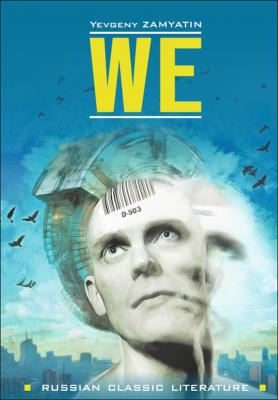We / Мы. Книга для чтения на английском языке. Евгений Замятин
Читать онлайн.| Название | We / Мы. Книга для чтения на английском языке |
|---|---|
| Автор произведения | Евгений Замятин |
| Жанр | Русская классика |
| Серия | Russian Classic Literature |
| Издательство | Русская классика |
| Год выпуска | 1920 |
| isbn | 978-5-9925-1373-8 |
The annunciator clicks: it is R-13. Let him come; in fact, I am glad. It is too difficult for me to be alone now…
On the plane surface of the paper, in the two-dimensional world, these lines are next to one another. But in a different world they… I am losing my sense of figures: twenty minutes may be two hundred or two hundred thousand. And it seems so strange to write down in calm, measured, carefully chosen words what has occurred just now between me and R. It is like sitting down in an armchair by your own bedside, legs crossed, and watching curiously how you yourself are writhing in the bed.
When R-13 entered, I was perfectly calm and normal. I spoke with sincere admiration of how splendidly he had succeeded in versifying the sentence, and told him that his trochees had been the most effective instrument of all in crushing and destroying that madman.
“I would even say – if I were asked to draw up a schematic blueprint of the Benefactor’s Machine, I would somehow, somehow find a way of incorporating your verses into the drawing,” I concluded.
But suddenly I noticed R’s eyes turn lusterless, his lips turn gray.
“What is it?”
“What, what! Oh… Oh, I’m simply tired of it. Everyone around talks of nothing but the sentence. I don’t want to hear about it any more. I just don’t want to!”
He frowned and rubbed the back of his head-that little box of his with its strange baggage that I did not understand. A pause. And then he found something in the box, pulled it out, opened it. His eyes glossed over with laughter as he jumped up.
“But for your Integral, I am composing… That will be… Oh, yes, that will be something!”
It was again the old R: thick, sputtering lips, spraying saliva, and a fountain of words. “You see” (“s” – a spray) “…that ancient legend about paradise… Why, it’s about us, about today. Yes! Just think. Those two, in paradise, were given a choice: happiness without freedom, or freedom without happiness. There was no third alternative. Those idiots chose freedom, and what came of it? Of course, for ages afterward they longed for the chains. The chains – you understand? That’s what world sorrow was about For ages! And only we have found the way of restoring happiness… No, wait listen further! The ancient God and we – side by side, at the same table. Yes! We have helped God ultimately to conquer the devil – for it was he who had tempted men to break the ban and get a taste of ruinous freedom, he, the evil serpent. And we, we’ve brought down our boot over his little head, and – cr-runch! Now everything is fine – we have paradise again. Again we are as innocent and simple-hearted as Adam and Eve. No more of that confusion about good and evil. Everything is simple – heavenly, childishly simple. The Benefactor, the Machine, the Cube, the Gas Bell, the Guardians – all this is good, all this is sublime, magnificent, noble, elevated, crystally pure. Because it protects our unfreedom – that is, our happiness. The ancients would begin to talk and think and break their heads – ethical, unethical… Well, then. In short, what about such a paradisiac poem, eh? And, of course, in the most serious tone… You understand? Quite something, eh?”
Конец ознакомительного фрагмента.
Текст предоставлен ООО «ЛитРес».
Прочитайте эту книгу целиком, купив полную легальную версию на ЛитРес.
Безопасно оплатить книгу можно банковской картой Visa, MasterCard, Maestro, со счета мобильного телефона, с платежного терминала, в салоне МТС или Связной, через PayPal, WebMoney, Яндекс.Деньги, QIWI Кошелек, бонусными картами или другим удобным Вам способом.
